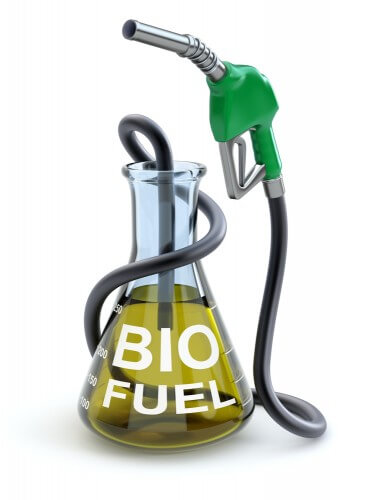Scientists have engineered a special strain of bacteria capable of breaking down biomass without pre-treating the biomass, in order to obtain ethanol used in the biofuel industry.

[by Dr. Nachmani Moshe]
Scientists have engineered a special strain of bacteria capable of breaking down biomass without pre-treating the biomass, in order to obtain ethanol used in the biofuel industry.
The usual approach to producing ethanol from plant biomass involves expensive pretreatment steps and reactions that use enzymes. The improvement of another approach known as consolidated bioprocessing (CPB) could reduce these costs. In the framework of integrated bioprocessing of the second generation, microorganisms are able to split a water molecule to obtain ethanol at reduced costs. Now, scientists have engineered a special strain of bacteria suitable for integrated bioprocessing that efficiently breaks down biomass without requiring pretreatment.
Direct conversion of biomass to ethanol without pretreatment represents a new pathway for integrated bioprocessing, providing a carbon-neutral, cost-effective and sustainable process for biofuel production. The production of ethanol from plant biomass usually requires three main steps: (1) physical-chemical preliminary treatment, (2) enzymatic breakdown of the biomass into sugars and (3) fermentation. The stages of pretreatment and hydrolysis are relatively expensive stages.
In an integrated bioprocessing approach, untreated cellulosic biomass is converted directly into biofuel in a single step with the help of a bacterium that decomposes the biomass and causes the sugars obtained from the decomposition to ferment. This unique bacterium (Caldicellulosiruptor bescii) succeeds in fermenting untreated grass, but it lacks the gene capable of producing ethanol. In light of the fact that this bacterium is a thermophilic ("heat-loving") bacterium and the process itself is carried out at high temperatures, it was necessary to find a heat-stable enzyme gene capable of synthesizing ethanol. The researchers found a candidate gene in a bacterium called Clostridium thermocellum and integrated it into the first bacterium. As a result, the new strain could now produce ethanol from cellulosic and grass biomass. In order to further improve the fermentation process, two genes that inhibit the fermentation reaction were removed.
With this unique strain, about 30% of the biomass could be fermented, obtaining 1.7 moles of ethanol for every 1.0 mole of glucose, close to the theoretical ratio of 1:2. Although this utilization can be further improved, this research is an important step in understanding the great potential of integrated bioprocessing and provides a mechanism for the preparation of advanced biofuels and other bioproducts directly from cellulosic biomass without an expensive and harsh step of pretreatment.
![A comparison of approaches to bioethanol production, including the approach of second-generation integrated bioprocessing that includes a one-step process in which a unique strain of bacteria breaks down the cellular biomass that has not undergone pretreatment and converts the resulting sugars into ethanol-type biofuel. [Courtesy © (2014) National Academy of Sciences, USA]](https://www.hayadan.org.il/images/content3/2015/04/F1.medium.gif)

15 תגובות
With the American gas reserves converted to methanol then the United States will become an oil exporter and not an importer. Because most of the oil is used in transportation. And to generate electricity they use more coal or atomic gas (the Americans are not building new reactors).
in brief ….
The point of producing biofuel from cellulose is that cellulose is an inedible agricultural waste and therefore no special cultivation is required for the biofuel. The problem I foresee is a lack of cellulosic waste (like straw) for animal feed and other uses. Also, it is not clear if there is enough waste to produce fuel in an amount that would meet our transportation needs...
i hope
Legal
Do not worry. In many, many years it will be easier and cheaper
to pump gas (even if in America there are still idiots who destroy
nature for "green" reasons - dollars). By all means
This is mainly about agricultural waste because biomass growth
Especially for the production of liquid hydrocarbon it is too expensive and too harmful.
They will start with garbage and continue to crops of destroyed corn and palm until life is seen only in books.
Don't want corn and palm crops for fuel
Don't leave it at the end
If this is the case
Yigal, why not green? Instead of releasing fossil carbon, waste is turned into carbon. Carbon is indeed released, but there is less air pollution. To avoid carbon emissions, you need to use hydroelectricity (Sea Canal?), solar wind - the supply is unreliable and limited. Unfortunately, Israel has fallen out of favor.
Non-green energy
For an alcoholic, it's because of the high taxation. High prices create a temptation to buy fake!
For the information of the Russian public 🙂
Ethanol and methanol is also present in alcohol. in low doses.
Too high a dose of alcoholic beverages results in damage to the nervous system and can cause death.
Currently, in Israel, there is a distribution of counterfeit alcoholic beverages that contain a high amount of ethanol.
There are biogas projects in Hiriya, in the Golan Heights and in other places where there is agricultural waste. Methanol can be made from natural gas but it is a longer process.
I saw with my own eyes a few years ago, and read about many similar studies. Apparently the problem is very difficult to solve. I know of a power plant that is located near the landfill of one of the largest cities in the USA that produces electricity from the waste generated in the garbage. But gas production is probably easier. Let's hope that one or more of the groups dealing with the issue will succeed. Success should include a resistant strain that is easy to grow, a simple process, easy collection of the ethanol, etc. So go up and succeed, we will all benefit.
It seems that today there is no shortage of oil, so perhaps they will invest less in these important projects.